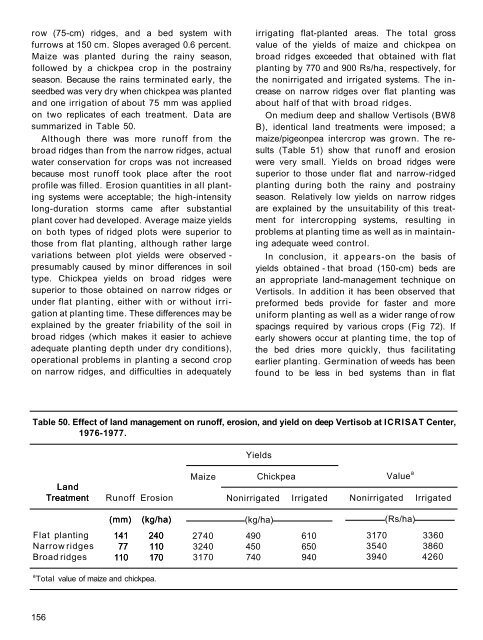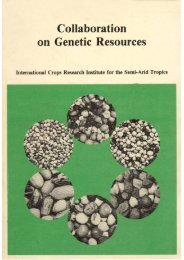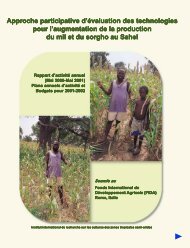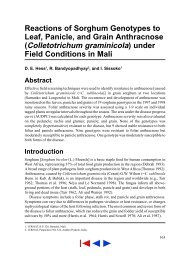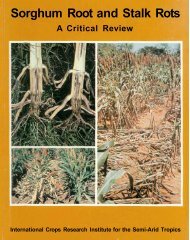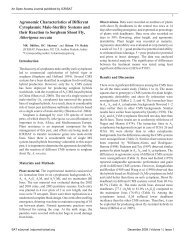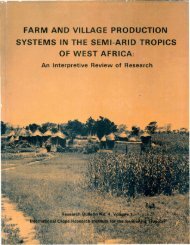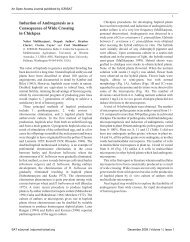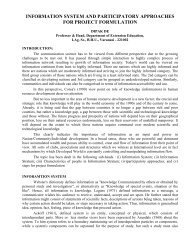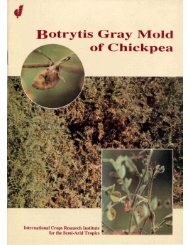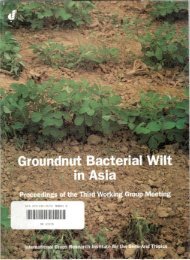You also want an ePaper? Increase the reach of your titles
YUMPU automatically turns print PDFs into web optimized ePapers that Google loves.
ow (75-cm) ridges, and a bed system with<br />
furrows at 150 cm. Slopes averaged 0.6 percent.<br />
Maize was planted during the rainy season,<br />
followed by a chickpea crop in the postrainy<br />
season. Because the rains terminated early, the<br />
seedbed was very dry when chickpea was planted<br />
and one irrigation of about 75 mm was applied<br />
on two replicates of each treatment. Data are<br />
summarized in Table 50.<br />
Although there was more runoff from the<br />
broad ridges than from the narrow ridges, actual<br />
water conservation for crops was not increased<br />
because most runoff took place after the root<br />
profile was filled. Erosion quantities in all planting<br />
systems were acceptable; the high-intensity<br />
long-duration storms came after substantial<br />
plant cover had developed. Average maize yields<br />
on both types of ridged plots were superior to<br />
those from flat planting, although rather large<br />
variations between plot yields were observed -<br />
presumably caused by minor differences in soil<br />
type. Chickpea yields on broad ridges were<br />
superior to those obtained on narrow ridges or<br />
under flat planting, either with or without irrigation<br />
at planting time. These differences may be<br />
explained by the greater friability of the soil in<br />
broad ridges (which makes it easier to achieve<br />
adequate planting depth under dry conditions),<br />
operational problems in planting a second crop<br />
on narrow ridges, and difficulties in adequately<br />
irrigating flat-planted areas. The total gross<br />
value of the yields of maize and chickpea on<br />
broad ridges exceeded that obtained with flat<br />
planting by 770 and 900 Rs/ha, respectively, for<br />
the nonirrigated and irrigated systems. The increase<br />
on narrow ridges over flat planting was<br />
about half of that with broad ridges.<br />
On medium deep and shallow Vertisols (BW8<br />
B), identical land treatments were imposed; a<br />
maize/pigeonpea intercrop was grown. The results<br />
(Table 51) show that runoff and erosion<br />
were very small. Yields on broad ridges were<br />
superior to those under flat and narrow-ridged<br />
planting during both the rainy and postrainy<br />
season. Relatively low yields on narrow ridges<br />
are explained by the unsuitability of this treatment<br />
for intercropping systems, resulting in<br />
problems at planting time as well as in maintaining<br />
adequate weed control.<br />
In conclusion, it appears-on the basis of<br />
yields obtained - that broad (150-cm) beds are<br />
an appropriate land-management technique on<br />
Vertisols. In addition it has been observed that<br />
preformed beds provide for faster and more<br />
uniform planting as well as a wider range of row<br />
spacings required by various crops (Fig 72). If<br />
early showers occur at planting time, the top of<br />
the bed dries more quickly, thus facilitating<br />
earlier planting. Germination of weeds has been<br />
found to be less in bed systems than in flat<br />
Table 50. Effect of land management on runoff, erosion, and yield on deep Vertisob at ICRISAT Center,<br />
1976-1977.<br />
Yields<br />
Maize Chickpea Value a<br />
Land<br />
Treatment Runoff Erosion Nonirrigated Irrigated Nonirrigated Irrigated<br />
(mm)<br />
(kg/ha)<br />
(kg/ha)<br />
(Rs/ha)<br />
Flat planting<br />
Narrow ridges<br />
Broad ridges<br />
141 240<br />
77 110<br />
110 170<br />
2740<br />
3240<br />
3170<br />
490 610<br />
450 650<br />
740 940<br />
3170 3360<br />
3540 3860<br />
3940 4260<br />
a Total value of maize and chickpea.<br />
156


